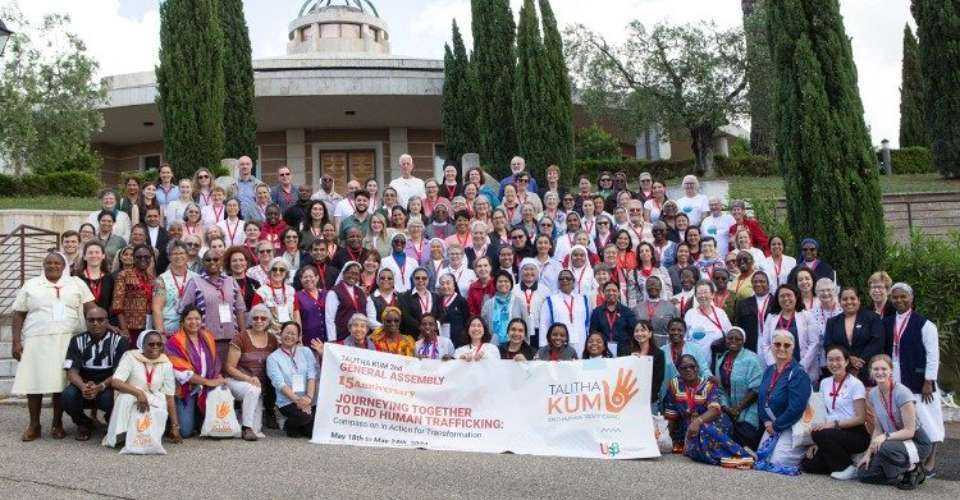
Official group photo from Talitha Kum's General Assembly. (Photo: M. Simionati/Talitha Kum, Vatican News)
Catholics fighting against human trafficking must work together in order to be truly effective against this "odious" crime, Pope Francis told an international network of religious working against human trafficking.
"Human trafficking is a 'systemic' evil and, therefore, we can and must eliminate it through a systematic, multi-level approach," he said in a message sent May 23 to the network, Talitha Kum, which was holding its second general assembly in Sacrofano, near Rome, May 18-24.
Some 153 delegates and participants from 71 countries, all representing the 60 Talitha Kum networks, attended the assembly. The global network was celebrating its 15th anniversary of being established under the International Union of Superiors General in 2009.
"Trafficking is fueled by wars and conflicts, thrives on the effects of climate change and socio-economic disparities and takes advantage of the vulnerability of those forced to migrate, as well as the conditions of inequality in which they find themselves, especially women and girls," the pope wrote.
"Trafficking is a 'business' that disrespects and disregards human dignity, delivering large profits to the unscrupulous," he wrote.
"Yet we must not be discouraged," he wrote. "With the power of the Spirit of Jesus Christ and the dedication of so many, we can succeed in eliminating it."
"To be truly effective against this odious criminal phenomenon, we need to be a community," which is expressed in the assembly's theme: "Journeying Together to End Human Trafficking: Compassion in Action for Transformation," the pope wrote.
He urged the global network that is rooted in local churches to continue what it has always done, "to stand by the victims, listen to them, help them get back on their feet and together take action against trafficking," including by making appeals that remind institutions and governments "to take up their responsibilities in this regard."
The pope also assured Talitha Kum that he would carefully read "and promote" the final declaration they drafted during their assembly.
The three-page declaration outlines the network's three priorities for 2025-2030 and reaffirmed its commitment to priorities from its first assembly in 2019.
Among its new priorities, Talitha Kum pledged to diversify its membership and broaden its partnerships among "church leaders, other religions and faith communities, governmental organizations, NGOs, women and men, young and old."
The network "is alive today thanks to the courageous and enduring commitment of women religious and their collaborators," it said. "We see lay people, clergy and young people as key to the long-term sustainability of our work to end human trafficking."
Greater community engagement and broad-based collaboration will be essential to raise awareness, to "stand up for equality between women and men and respect for human rights," to share best practices and data analysis, and to foster the active involvement of young people as "leaders of our online campaigns," the declaration said.
Strengthening its "holistic, survivor-centered" approach was another priority, it said. It will seek to be even more "survivor-informed and trauma-sensitive -- listening to their stories, consulting them in decision-making processes and putting them at the heart of our networks."
The group committed to promoting "safe and secure spaces/shelters, survivor-to-survivor peer support, and survivor-led initiatives," it said, as well as "establishing spaces for non-judgmental listening, hotlines and mobile app reporting."
Because the complex systems that enable human trafficking "need to be dismantled through concrete steps toward social, economic, cultural and political transformation," it said it would commit to "empowering women, children, and youth toward more just, equitable societies" and "adopting effective strategies to reduce the demand for human trafficking, including through education for boys and men and advocacy for regular migration pathways."
Advocating for the prosecution of traffickers and for effective policies and laws, and exposing the risks of online trafficking and social media were also priorities, it said.
Sister Mary T. Barron, superior of the Missionary Sisters of Our Lady of the Apostles and president of the International Union of Superiors General, said in her opening address to the assembly that their "collective efforts to combat this heinous crime" do not reflect mere "social activism; we are bringing to life a theology of liberation that champions the intrinsic worth of every human being."
"Our faith is not passive but demands active engagement in the pursuit of justice and the restoration of human dignity," she said on May 18.
"Let the next fifteen years be marked by even greater achievements, as we strive not only to liberate the oppressed but to dismantle the very systems that perpetuate injustice," she added.




Share your comments